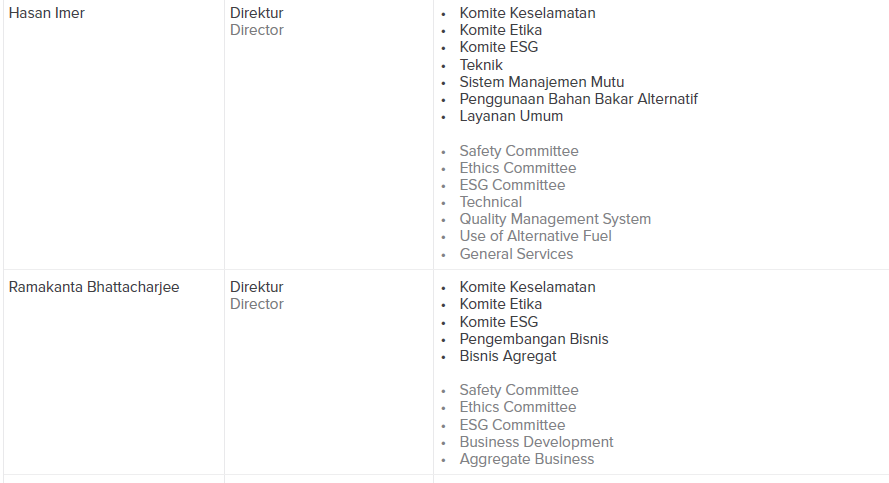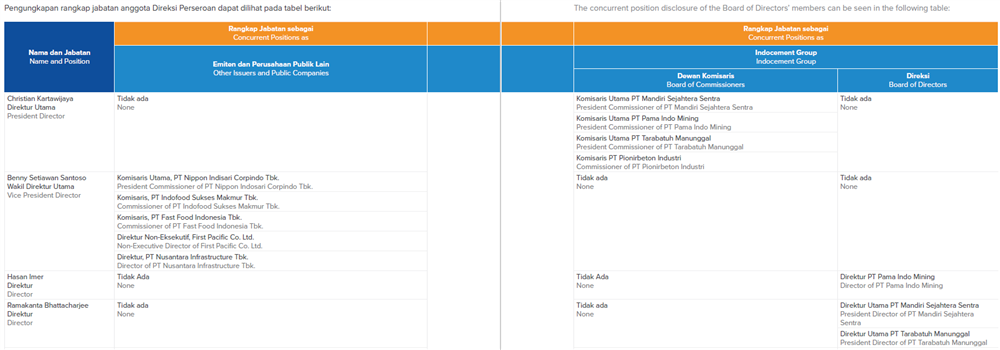- About Us
- Our Business
- Investors
- Governance
- Responsibility
- Careers
- News & Event
- Contact Us
Governance
Duties and responsibilities of the Board of Directors are set out in the Company’s Articles of Association and the Board Charter, including:
Duties and Responsibilities of the Board of Directors
To optimally perform its duties and responsibilities, the Board of Directors divides the duties and responsibilities to each member of Board of Directors according to each one’s expertise, reviews and updates the division of roles and responsibilities from time to time.
The division of duties and responsibilities of the Board of Directors in 2022 are:




As stipulated in the Board of Directors Charter and the Company's Articles of Association, the authority includes:
1. The Board of Directors is reponsible for managing the Company in line with the Company's policies to achieve the Company's purposes and objectives.
2. The Board of Directors has the authority to perform the following matters:
a. Establishing, maintaining, and regulating the Company's policies.
b. Managing the Company's workforce, inclusing determining salary, pension, and other allowances of the Company's Employees in accordance with the applicable laws and regulations and/or GMS resolutions (if any).
c. Appointing and terminating Company's Employees in accordance with the applicable laws and regulations.
d. Delegating the Board of Directors' authority to represent the Company to one or more members of Board of Directors who are specifically appointed for such matter or to one or more employees of the Company, either individually or jointly with other person or entity.
e. Performing other actions according to the directions and reccomendation of Board of Commissioners.
3. The Director has the authority to represent the Company, expect such member is:
a. having dispute with the Company.
b. having conflict of interest with the Company, in such matter, the authorized pasrty representing the Company shall be:
• Another member of the Board of Directors without conflict of interest with the Company; or
• Board of Commissioners, in the event that all members of the Board of Directors have conflict of interest with the Company; or
• Another party appointed by the GMS, in the event that all members of the Board of Directors and Board of Commissioners have conflict of interest with the Company.
In addition to regulating the authority of the Board of Directors, the Board Charter and the Company’s Articles of Association also limits the authority of the Company’s Board of Directors, as follows:
1. borrowing or lending money on behalf of the Company with a value exceeding 20 million US Dollar or its equivalent value in another currency in one transaction;
2. buying, selling, or in any ways acquiring or releasing rights to immoavable property including buildings and land rights, in the event that each transaction's value exceeds 5 million US Dollar or its equivalent amount in another currency;
3. pledging or charging the Company's assets as collateral for non-operational transactions with value exceeding 20 million US Dollar or its equivalent value in another currency;
4. binding the Company as guarantor/warranter;
5. incorporating a subsidiary with an authorized capital of more than 5 million US Dollar or its equivalent value in another currency;
6. taking part or participating in another company or legal entity or organizing a new company that has an authorized capital of more than 5 million US Dollar or its equivalent value in another currency;
7. releasing part or all of the Company's investment in another company or legal entity with a transaction value exceeding 5 million US Dollars or its equivalent value in another currency.
If the limitations of authority are exceeded, the Board of Directors shall obtain the prior approval of the Board of Commissioners in accordance with the Company’s Articles of Association.
If the limitations of authority are exceeded, the Board of Directors shall obtain the prior approval of the Board of Commissioners in accordance with the Company’s Articles of Association.
Independency of the Board of Directors
In carrying out its duties and responsibilities, the Board of Directors acts independently and is free from the interests of any party. The independence of the Board of Directors of the Company is also evident from the share ownership of members of the Board of Directors and concurrent positions of members of the Board of Directors. The Company requires members of the Board of Directors to disclose their share ownership in a report that is updated annually.
Board of Directors Concurrent Positions
The concurrent position of the Board of Directors as similarly applied to the Board of Commissioners refers to the provisions on concurrent position of the Board of Directors of Article 6, POJK No. 33 as stipulated in the Board Manual of Board of Directors and Board of Commissioners.
This regulation stipulates that members of Board of Directors may have concurrent position under the following provisions:
Information related to members of the Board of Directors’ other concurrent positions in Indocement are as follows:



Based on the information in the table above, the concurrent positions of members of the Board of Directors have complied with the provisions for concurrent positions in Article 24 of POJK 33/2014.